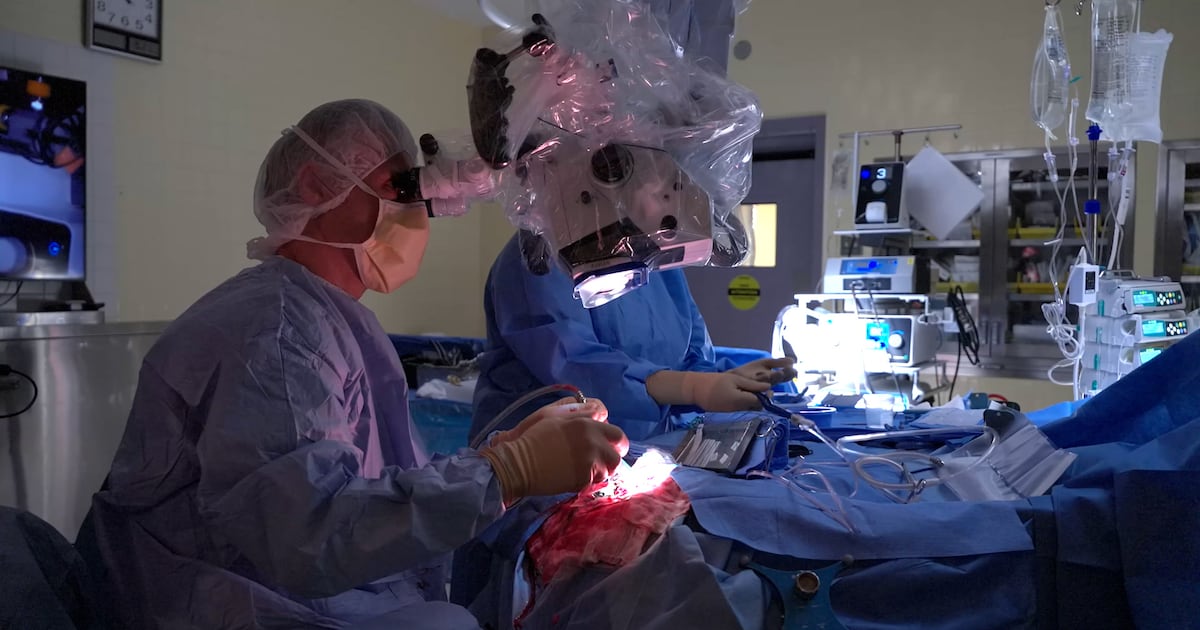Science
Montreal Surgical Device Uses AI to Transform Cancer Treatment

A groundbreaking surgical device developed in Montreal is helping patients extend their lives by improving the accuracy of cancer removal during surgeries. The device, known as SENTRY, utilizes artificial intelligence (AI) to distinguish between cancerous and healthy tissue. This innovation is credited with giving patients like Peter Ross a second chance at life.
Ross, who was diagnosed with a brain tumor almost four years ago and given just 14 months to live, is now preparing to become a grandparent. “It’s given me the rest of my life,” he expressed, reflecting on the impact of the SENTRY device. His wife, Sandrine Menard, shared in his gratitude, noting, “Whatever happens, we’re grateful.”
The SENTRY device was co-founded by Dr. Kevin Petrecca, a surgeon at Montreal Neuro. Petrecca explains that the handheld device provides surgeons with crucial information during procedures. It boasts an impressive accuracy rate, identifying tumors correctly 98.7% of the time and confirming normal brain tissue with 100% accuracy.
“Cancer is not visible to the naked eye or any other technology,” Petrecca stated. This limitation makes SENTRY’s capabilities revolutionary, allowing surgeons to remove more cancerous tissue than ever before. The device provides feedback in less than three seconds, informing the surgeon whether the tissue in contact contains tumor cells.
According to Petrecca, using SENTRY during surgery can potentially extend a patient’s life by two to five times longer than previously expected. While the device has been primarily tested in brain surgeries, its application extends to other areas, including breast and lung cancer detection.
Hundreds of patients, including Ross, have participated in clinical trials for the device. Ross remarked, “I take every extra day that’s given to me to go out and walk, and just enjoy life because I owe that to this surgery.”
Looking ahead, SENTRY is preparing for a pivotal trial scheduled for May 2024, which aims for FDA approval. Ross is hopeful that this advancement will pave the way for more patients to experience significant life milestones, as he has been fortunate enough to do.
The development of SENTRY exemplifies the intersection of technology and healthcare, showcasing how innovations in AI can enhance surgical outcomes and improve the quality of life for cancer patients. As the medical community anticipates the device’s potential approval, the lives it may save continue to inspire hope and gratitude among patients and their families.
-

 Lifestyle2 months ago
Lifestyle2 months agoWinnipeg Celebrates Culinary Creativity During Le Burger Week 2025
-

 Health2 months ago
Health2 months agoMontreal’s Groupe Marcelle Leads Canadian Cosmetic Industry Growth
-

 Science2 months ago
Science2 months agoMicrosoft Confirms U.S. Law Overrules Canadian Data Sovereignty
-

 Education2 months ago
Education2 months agoRed River College Launches New Programs to Address Industry Needs
-

 Technology2 months ago
Technology2 months agoDragon Ball: Sparking! Zero Launching on Switch and Switch 2 This November
-

 Science2 months ago
Science2 months agoTech Innovator Amandipp Singh Transforms Hiring for Disabled
-

 Technology2 weeks ago
Technology2 weeks agoDiscord Faces Serious Security Breach Affecting Millions
-

 Technology2 months ago
Technology2 months agoGoogle Pixel 10 Pro Fold Specs Unveiled Ahead of Launch
-

 Science2 months ago
Science2 months agoChina’s Wukong Spacesuit Sets New Standard for AI in Space
-

 Technology2 months ago
Technology2 months agoWorld of Warcraft Players Buzz Over 19-Quest Bee Challenge
-

 Education2 months ago
Education2 months agoAlberta Teachers’ Strike: Potential Impacts on Students and Families
-

 Business2 months ago
Business2 months agoDawson City Residents Rally Around Buy Canadian Movement
-

 Technology2 weeks ago
Technology2 weeks agoHuawei MatePad 12X Redefines Tablet Experience for Professionals
-

 Business2 months ago
Business2 months agoNew Estimates Reveal ChatGPT-5 Energy Use Could Soar
-

 Science2 months ago
Science2 months agoXi Labs Innovates with New AI Operating System Set for 2025 Launch
-

 Technology2 months ago
Technology2 months agoInnovative 140W GaN Travel Adapter Combines Power and Convenience
-

 Technology2 months ago
Technology2 months agoFuture Entertainment Launches DDoD with Gameplay Trailer Showcase
-

 Technology2 months ago
Technology2 months agoGlobal Launch of Ragnarok M: Classic Set for September 3, 2025
-

 Education1 month ago
Education1 month agoBrandon University’s Failed $5 Million Project Sparks Oversight Review
-

 Business2 months ago
Business2 months agoBNA Brewing to Open New Bowling Alley in Downtown Penticton
-

 Technology2 months ago
Technology2 months agoNew IDR01 Smart Ring Offers Advanced Sports Tracking for $169
-

 Technology2 months ago
Technology2 months agoArsanesia Unveils Smith’s Chronicles with Steam Page and Trailer
-

 Science2 months ago
Science2 months agoNew Precision Approach to Treating Depression Tailors Care to Patients
-

 Technology2 months ago
Technology2 months agoHumanoid Robots Compete in Hilarious Debut Games in Beijing










